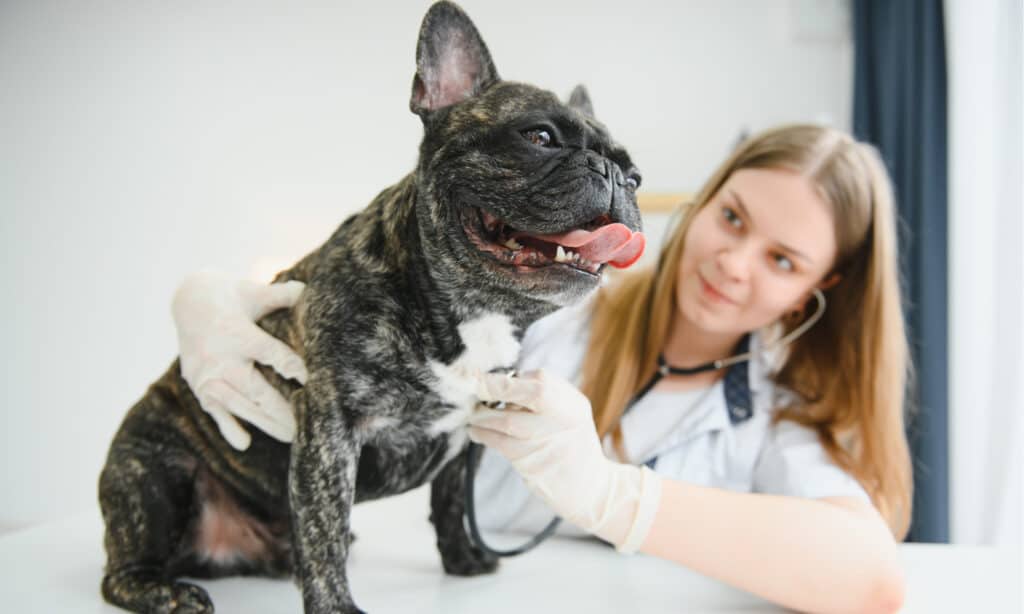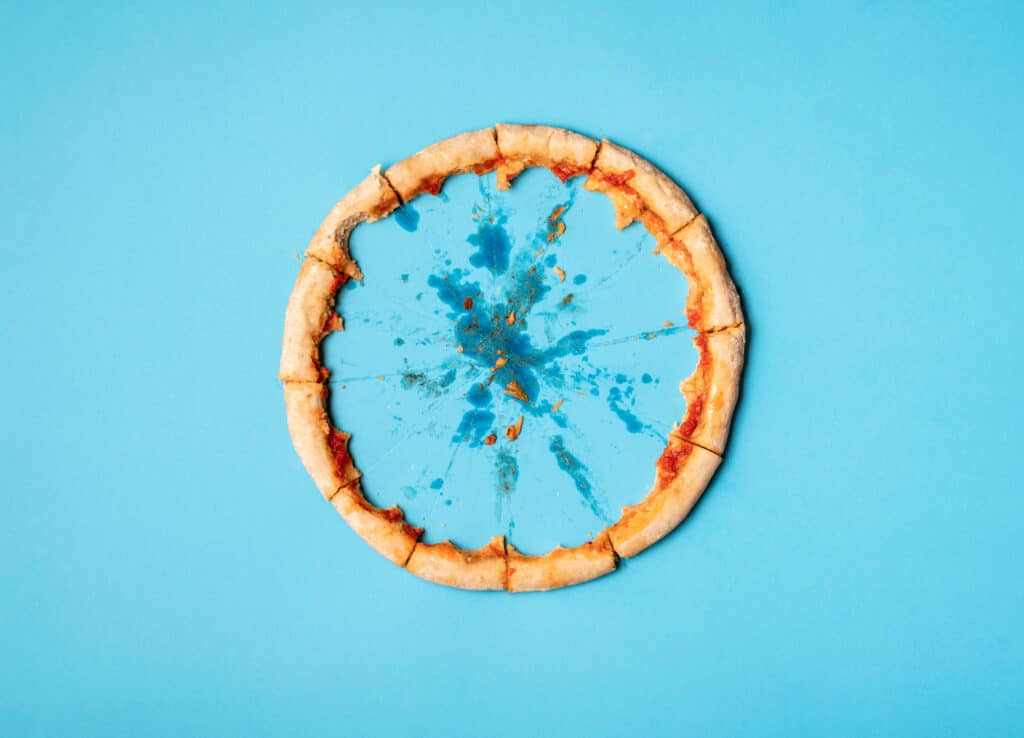Pizza is a popular food and one whiff is enough to bring the kids downstairs for dinner without complaint. They aren’t the only ones that love that rich cheesy scent, though. Dogs do, too! So, that begs the question, is pizza safe or dangerous for dogs to eat? They’d certainly love to wolf down a whole pizza, but let’s find out if you can share your stuffed crust meat feast safely.
Is Pizza Safe for Dogs to Eat?

Many ingredients used to make pizza, even just cheese pizza, are harmful to dogs, for a variety of reasons.
©iStock.com/ulkas
No, pizza isn’t safe for dogs to eat. Although it smells delicious and cheese isn’t toxic, there are lots of other issues. These include the vast amounts of fat, sodium, and sugar in pizza plus toxic toppings such as onion and garlic.
Although they’ll beg non-stop, it just isn’t safe to give Rover a slice of pizza.
What Is Pizza?
Pizza originates from Italy and it’s been eaten since at least the 10th century! Traditional pizza is made by creating a flat dough base with a cheese and tomato topping. It’s then baked hot and fast.
The Guinness World Record for the largest pizza was fittingly won in Rome, Italy in 2012. It measured a whopping 13,570 square feet (1261 meters) and was named Ottavia after the first Roman emperor Octavian.
Health Benefits of Pizza
There are very few health benefits to pizza and those that do exist are pretty much wiped out by the risks, but let’s take a look.
- Cheese – cheese is fatty but it’s full of calcium that’s essential for strong bones
- Bell peppers – bell peppers are a common pizza topping and they’re good for dogs because they contain lots of vitamins and beta-carotene for great eyesight
- Mushrooms – store-bought mushrooms have lots of antioxidants and selenium to help repair cell damage and infection plus magnesium that regulates nerve function and blood sugar levels.
- Tomatoes – tomatoes contain vitamin C for a healthy immune system and vitamin K which is essential for efficient blood clotting
That said, these health benefits are overturned by pizza’s large amounts of fat, sugar, and sodium plus the risk of toxic common ingredients like garlic and onions.
It’s much healthier and safer to offer your dogs these toppings independently, so they can reap the benefits without getting sick. Treat food should make up no more than 10% of a dog’s daily diet according to the ASPCA. The rest should be completely dog food.
The Risks of Pizza
There are several risks when it comes to dogs and pizza. Yes, they love this tasty takeaway but no matter how hard they beg, here’s why dogs shouldn’t eat pizza.
Fat
Fat is the main problem with pizza. It’s loaded with fatty cheese as a starting point and it usually gets worse when the topping includes meat.
Obesity is a major problem for dogs in the United States. According to Association for Pet Obesity Prevention 56% of pet dogs are overweight or obese. Overweight dogs are more prone to disease like cancer, mobility issues, painful joints, diabetes, and pancreatitis.
Pancreatitis is a condition brought on by fatty foods and it’s horribly painful. The pancreas’ job is producing enzymes that break down sugars and fats, but when it gets inflamed it produces enzymes too early before it reaches any food. With no food to dissolve, the enzymes digest the pancreas instead.
If your dog has an attack of pancreatitis it’s much more likely to happen again in future, so they’ll need a low-fat diet forever.
Sodium
Pizza is loaded with salt in the dough, cheese and in toppings like pepperoni. You’ll know this from when you’ve woken up in the night with a salt hangover from your takeaway! Too much salt can lead to hypertension which is dangerous in humans and dogs.
Hypertension (high blood pressure) is dangerous for dogs because it can lead to blindness, detached retinas, depression, seizures, nose bleeds, blood in urine, and heart murmurs. It can lead to early death and really minimize their quality of life. One slice of cheese and tomato (margarita) pizza has more than double the amount of salt a dog needs in one day.
Onions and Garlic
Dogs are omnivores (not carnivores like gray wolves), so they are capable of eating a wide range of fruits and vegetables; however, the allium family, which includes onions, garlic, leeks, and shallots, is toxic. Allium compounds attach to a dog’s red blood cells and cause anemia.
Garlic and onion are frequent pizza toppings, but they’re also used in powder or puree forms to boost flavor, so there’s more in a pizza than you think, even a plain old cheese and tomato thin crust.
Lactose and Wheat Intolerance
Dogs with wheat or lactose intolerances can’t eat pizza because the crust contains wheat and cheese is full of lactose.
My Dog Ate Pizza, What Do I Do?

If your dog shows any adverse side effects after ingesting pizza, seek vet care.
©Hryshchyshen Serhii/Shutterstock.com
It depends on how much it’s eaten.
A bite shouldn’t hurt, but a full pizza or even a slice isn’t going to sit well and may cause bigger problems. This is particularly likely in smaller breeds that need less food than large dogs.
They might be lucky and have no problems, but an upset stomach could occur. Diarrhea and vomiting are distressing for dogs and it’s a horrible mess to clear up.
Feed them regular small meals of rice and chicken or turkey and put down fresh water frequently. If the upset lasts more than a few days, call your vet for advice because it can lead to dehydration.
If your dog shows worsening symptoms like stomach ache, panting, drooling, or they’re distressed in another way then call a vet right away for advice. They could have pancreatitis, a reaction to toxic ingredients, or even sodium poisoning depending on the dog’s size and how much they ate.
Can Dogs Eat Pizza Crust?

Even pizza crust can pose problems for dogs, if they have too much or eat it too quickly.
©YesPhotographers/Shutterstock.com
Pizza crust is often discarded and it’s easy prey for a dog who’s been trying to levitate the pizza from its box all evening. A small amount of pizza crust probably won’t hurt, but it does contain salt and may contain cheese if it’s a stuffed crust version. Monitor your dog and call a vet if you’re concerned.
Another risk of discarded pizza crusts is a dog’s tendency to swallow stolen foods as quickly as possible. You’ll have seen this on walks when you shout “put that down now!” but your dog just chews faster. Pizza crust is dense and may cause choking if it isn’t chewed up properly. It might seem a waste, but pizza slices are junk food that isn’t suitable for pets or wildlife so put leftover crusts in the trash as soon as you’ve finished eating.
Can Dogs Eat Pizza Dough?
No, dogs cannot pizza dough and it can be fatal if they do. Snaffling pizza dough is a medical emergency.
It’s because pizza dough is full of yeast and when it rises in the heat of your dog’s stomach it distends its insides, creating dangerous bloat. But that’s not all. Rising yeast creates alcohol which can poison your dog and even be fatal.
Pizza and bread dough are very dangerous for dogs, so call a vet immediately if they get a hold of some.
What Foods are Bad for Dogs?
All fatty foods are bad for dogs and there are some specific foods that are highly toxic to them, too. They include grapes, chocolate, Xylitol, macadamia nuts, black walnuts, avocado, alliums, and any form of alcohol.
Any processed foods including these ingredients are also toxic, such as raisins, which are dried grapes; Jell-O, which often contains artificial sweeteners; Xylitol; and cakes that contain macadamia nuts and/or chocolate.
Pizza Is Not Good for Dogs
It’s a shame to say it because dogs love cheese and the smell of pizza can drive them bonkers, but pizza isn’t a safe food for them.
While a small piece probably won’t harm them unless they have a wheat or lactose intolerance, pizza contains way too much fat, sodium, and salt for doggos. There’s the additional risk of toxic onion and garlic, too.
It’s just not worth the risk of hypertension, pancreatitis, or toxic poisoning. Treat your four-legged friend to a healthy treat that’s safe for him or her, such as a small amount of cottage cheese, peanut butter in a Kong, bell peppers, carrot sticks, or fresh apple slices. Maybe even a cheeky puppuccino on very rare occasions!
Up Next…
- Can Dogs Be Vegan? What Are The Risks?
- Dogs Cannot Eat Salami Safely, Here’s Why
- Can Dogs Eat Jell-O? Is It Safe or Dangerous?
The photo featured at the top of this post is © MMD Made my dreams/Shutterstock.com
Ready to discover the top 10 cutest dog breeds in the entire world?
How about the fastest dogs, the largest dogs and those that are -- quite frankly -- just the kindest dogs on the planet? Each day, AZ Animals sends out lists just like this to our thousands of email subscribers. And the best part? It's FREE. Join today by entering your email below.
Sources
- VCA Animals Hospitals, Available here: https://vcahospitals.com/know-your-pet/systemic-hypertension-in-dogs
- VCA Animal Hospitals, Available here: https://vcahospitals.com/know-your-pet/pancreatitis-in-dogs
- Your Dictionary, Available here: https://web.archive.org/web/20030115224054/http://www.yourdictionary.com/library/pizza.html
- Guinness World Records, Available here: https://www.guinnessworldrecords.com/world-records/largest-pizza
Thank you for reading! Have some feedback for us? Contact the AZ Animals editorial team.






